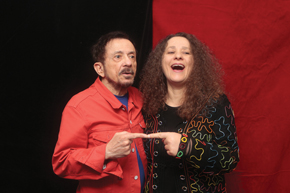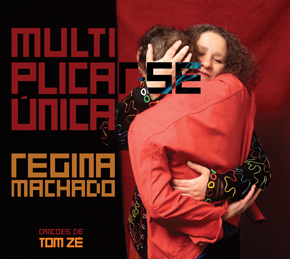
Gal Oppido Machado with Tom Zé: a partnership begun in the 1980s, when the singer performed at the composer’s concertsGal Oppido
For her 2015 independent CD, singer Regina Machado chose Multiplicar-se única (Multiply yourself into one) as the title track of a recording of Tom Zé songs. The choice says a lot about Machado (herself a composer as well as researcher and teacher) and her academic and artistic work, through which a study of voice has opened a path to a variety of musical roles.
A graduate of the University of Campinas (Unicamp), where she now teaches at the Arts Institute (IA), Machado wrote A voz na canção popular brasileira – Um estudo sobre a Vanguarda Paulista (Voice in Brazilian popular music: a study of the São Paulo vanguard), published by Ateliê Editorial. Based on her 2007 Unicamp Master’s thesis, the book explores this independent movement of the 1980s through the medium of voice. “I chose this period because it showed us new methods of vocal realization based on an understanding of intonation patterns in our spoken language,” explains Machado. This incorporation into song of the rhythms and patterns of speech is common feature of the São Paulo Vanguard, especially in the work of artists such as Ná Ozzetti, Tetê Espíndola and Arrigo Barnabé.
There is a remarkable interplay between the academic and artistic in Machado’s recordings, reflected in her choice of repertoire, and even in her elaborate arrangements and performances. The singer entered university life “belatedly,” at age 27. In an era when young people customarily entered college directly after high school, she decided to dedicate herself to evenings of instrumental and vocal performance, including singing back-up for Tom Zé. “That musical world surprised me,” Machado remembers. “It wasn’t just music: it was performance as well, and he would talk about things like Eastern philosophy, semiotics and literature. Something told me that this was the path I wanted to follow.”
In the 1990s, Machado founded her own school, Canto do Brasil (Song of Brazil), where singer Mônica Salmaso trained and that exists to this day in São Paulo’s Lapa neighborhood.
In four CDs recorded since 2000, Machado had featured her own compositions as well as those of less recognized artists. While including her own vocal interpretations of songs by Chico Buarque, Edu Lobo and Caetano Veloso, Machado avoided their classic hits. “My academic career followed along the lines of these musical references,” Machado explains. “I believe that everything goes into the task—doing, listening, and singing;” and in so doing the vocalist found the raw material for her subsequent academic career. “The same music that always enchanted me and drove my desire to follow through with my professional goals, led me to study and understand the currents that brought me to where I am today.”

ReproductionMachado’s just released fourth CD, in which she engages in various musical rolesReproduction
Two important figures along this journey are Luiz Tatit and Dante Ozzetti, independent artists with ties to the alternative entertainment music industry that gave rise to the São Paulo Vanguard. Ozzetti produced Machado’s recording of Tom Zé songs. Tatit wrote the preface to her book and served as advisor for her dissertation, Da intenção ao gesto interpretativo – Análise semiótica do canto popular brasileiro (From purpose to interpretative gesture: a semiotic analysis of Brazilian popular music), which Machado defended in 2012, for her doctorate in linguistics and semiotics from the University of São Paulo School of Philosophy, Literature and Human Sciences. “Regina is a singer who is interested in how songs are composed, and this explains why she decided to engage in research and seek guidance,” says Tatit. “She wanted some analytical criteria on how to derive specific interpretations for certain songs. Behind this might be her interest in studying semiotics, which fosters a broader view of sense construction in auditory or visual modalities; and she immersed herself in this.”
Beyond the satisfaction she derives from her research, Machado sees her work as a teacher especially valuable for the opportunity to have contact with her students, some of whom, like Lineker and Lívia Nestrovski, rank among the outstanding vocalists of their generation. “These are artists who still have a lot of achievements ahead,” says Machado of her former students.
Research is another vehicle that keeps the generations in touch with each other: through projects, for example, like Machado’s “Vox Mundi – Grupo de estudos da voz popular midiatizada, erudita e dos povos tradicionais” (Vox Mundi: a study group on mediatized, erudite and traditional peoples in the popular voice) at IA-Unicamp, where she and singer Magda Pucci (music director of the Mawaca group and Machado’s former student) meet once a week with students. “Each student is assigned his own task in the form of individual research, but all are connected with my own; that is, they work with voice and the building of the senses,” explains Machado.
In 2013 and 2015, the group organized two artistic/academic events at Unicamp called “Gathering for the Study of Singing” and “Popular Song” that included concerts, lectures, classes, and panel discussions. Tatit, José Miguel Wisnik (musician, composer, and essayist), Roberto Mendes (singer, composer and violinist) and Tiganá Santana (singer, composer, violinist, and poet) were among the participants. In Machado’s description, the events “were incredible experiences for everybody, both in and outside the university, because of the opportunity they provided for dialogue and for us to understand that the arts exist in universities because they represent something essential to the human creative process.”
Republish